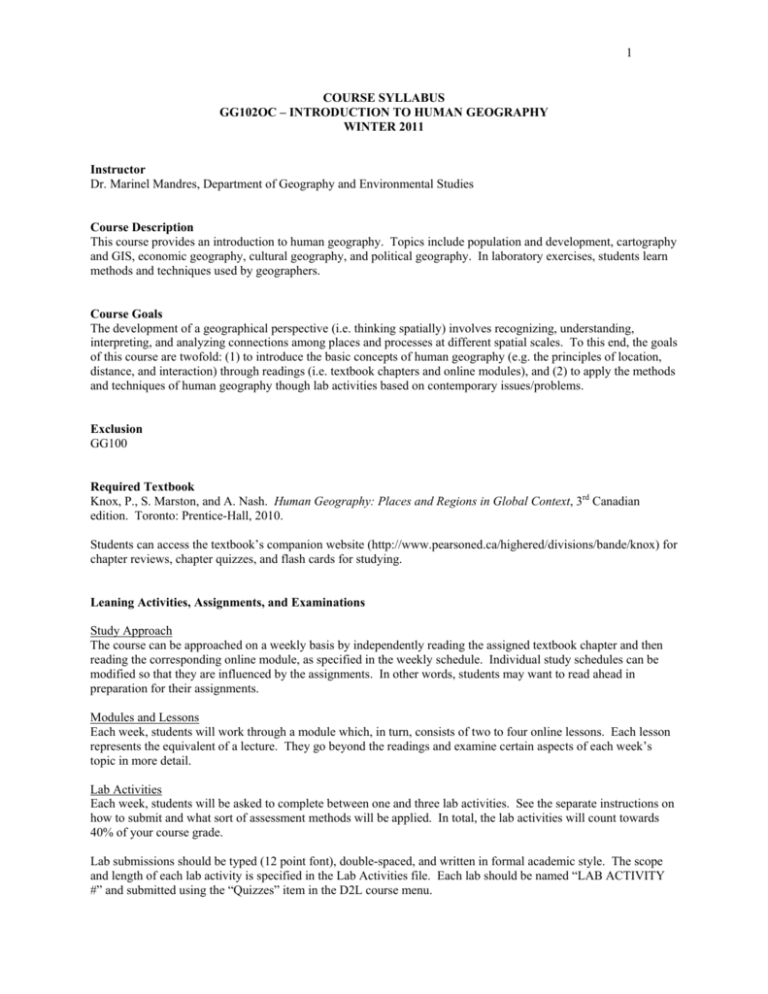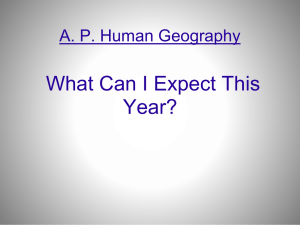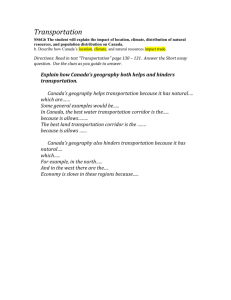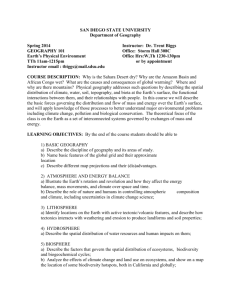INTRODUCTION TO HUMAN GEOGRAPHY WINTER 2011
advertisement

1 COURSE SYLLABUS GG102OC – INTRODUCTION TO HUMAN GEOGRAPHY WINTER 2011 Instructor Dr. Marinel Mandres, Department of Geography and Environmental Studies Course Description This course provides an introduction to human geography. Topics include population and development, cartography and GIS, economic geography, cultural geography, and political geography. In laboratory exercises, students learn methods and techniques used by geographers. Course Goals The development of a geographical perspective (i.e. thinking spatially) involves recognizing, understanding, interpreting, and analyzing connections among places and processes at different spatial scales. To this end, the goals of this course are twofold: (1) to introduce the basic concepts of human geography (e.g. the principles of location, distance, and interaction) through readings (i.e. textbook chapters and online modules), and (2) to apply the methods and techniques of human geography though lab activities based on contemporary issues/problems. Exclusion GG100 Required Textbook Knox, P., S. Marston, and A. Nash. Human Geography: Places and Regions in Global Context, 3rd Canadian edition. Toronto: Prentice-Hall, 2010. Students can access the textbook’s companion website (http://www.pearsoned.ca/highered/divisions/bande/knox) for chapter reviews, chapter quizzes, and flash cards for studying. Leaning Activities, Assignments, and Examinations Study Approach The course can be approached on a weekly basis by independently reading the assigned textbook chapter and then reading the corresponding online module, as specified in the weekly schedule. Individual study schedules can be modified so that they are influenced by the assignments. In other words, students may want to read ahead in preparation for their assignments. Modules and Lessons Each week, students will work through a module which, in turn, consists of two to four online lessons. Each lesson represents the equivalent of a lecture. They go beyond the readings and examine certain aspects of each week’s topic in more detail. Lab Activities Each week, students will be asked to complete between one and three lab activities. See the separate instructions on how to submit and what sort of assessment methods will be applied. In total, the lab activities will count towards 40% of your course grade. Lab submissions should be typed (12 point font), double-spaced, and written in formal academic style. The scope and length of each lab activity is specified in the Lab Activities file. Each lab should be named “LAB ACTIVITY #” and submitted using the “Quizzes” item in the D2L course menu. 2 Midterm Examination and Final Examination The two examinations are worth 20% and 35%, respectively. The Undergraduate Calendar states that “[i]t is the student’s responsibility to be available to take the examination at the scheduled times. Students are advised not to make commitments during the official exam period.” The final exam period for this course is April 07-28, 2011. All examinations must be taken at the scheduled times. Requests for exam deferral are made to the instructor and may be granted on the basis of: (1) illness (physician’s note required), and (2) family or personal emergencies (documentation required). No academic consideration will be given to students who present themselves after an examination written. Discussion Board Students are strongly encouraged to post questions, comments, and ideas about the readings, lessons, and lab exercises. The discussion board should be checked on a regular basis for important updates and information. The 5% class participation mark is exclusively based upon discussion board postings (originals and responses) and will be calculated on April 02, 2011 at 20:30. To obtain full marks (i.e. 5/5), students must post at least five relevant contributions which share ideas and experiences. Student Evaluation Lab Activities Class Participation Midterm Examination Final Examination 40% 05% 20% 35% 100% 13 lab activities (7 out of 10 points each, 2 pass/fail, 3 not submitted) calculated on April 1, 2011 (out of 5 points) written in Week 6 (out of 75 points) to be scheduled in April, 2011 (out of 100 points) Information about the format and coverage of the midterm and final exams is posted under the Course Notes. 3 Weekly Schedule Week/Date 1. Jan. 03 2. Jan. 10 3. Jan. 17 4. Jan. 24 5. Jan. 31 6. Feb. 07 7. Feb. 14 8. Feb. 28 9. Mar. 07 10. Mar. 14 11. Mar. 21 12. Mar. 28 Module Themes and Lesson Topics Geography Matters • Why Places Matter • Why Geography Matters • Geography in Canada The Changing Global Context • The Changing World • Geographic Expression, Integration, and Change • Mapping a New World Geography • Organizing the Periphery Geographies of Population • The Demographer’s Toolbox • Population Distribution and Structure • Population Dynamics and Processes • Population Movement and Migration • Population Debates and Policies • Population, Health, and the Environment Nature, Society and Technology • Nature as A Concept • The Transformation of Earth by Ancient Humans • European Expansion and Globalization • Human Action and Recent Environmental Change Mapping Cultural Identities • Culture as a Geographical Process • Building Cultural Complexities • Cultural Systems • Culture and Identity • Culture and the Physical Environment • Globalization and Cultural Change Cultural Geography • Landscapes, Meaning and Identity • Gender and Spatial Mobility • Gender and Urban Poverty Geography of Economic Development • What “Economic Development” Means • Everything in Its Place: Principles of Location • Pathways to Development • Globalization and Local Economic Development Agriculture and Food Production • Traditional Agricultural Geography • Agricultural Revolution and Industrialization • Global Restructuring of Agricultural Systems • Social and Technological Change in Global Agricultural Restructuring • The Environment and Agricultural Industrialization The Politics of Territory and Space • The Development of Political Geography • Geopolitics and the World Order • The Two-Way Street of Politics and Geography Urbanization • Urban Geography and Urbanization • Urban Origins • World Urbanization Today • Urban Growth Processes City Spaces: Urban Structure • Urban Structure and Land Use • Urban Form and Design • Urban Trends and Problems Future Geographies • Mapping Our Futures • Global Outlook, Local Perspectives • Resources, Technology, and Spatial Change • Adjusting to the Future Learning Activities Readings: Textbook Chapter 1 Online Activities: Module 1 Lab Activity 1.1: due Jan. 09 at 23:59 (do but don’t submit Lab Activities 1.2 and 1.3) Readings: Textbook Chapter 2 Online Activities: Module 2 Lab Activities 2.1 and 2.2: due Jan. 16 at 23:59 Readings: Textbook Chapter 3 Online Activities: Module 3 Lab Activity 3.2: due Jan. 23 at 23:59 (do but don’t submit Lab Activity 3.1) Readings: Textbook Chapter 4 Online Activities: Module 4 Lab Activities 4.1 and 4.2: due Jan. 30 at 23:59 Readings: Textbook Chapter 5 Online Activities: Module 5 Lab Activity 5: due Feb. 06 at 23:59 Readings: Textbook Chapter 6 Online Activities: Module 6 Lab Activity 6: due Feb. 27 at 23:59 Midterm Exam: Covers Weeks 1-5 Readings: Textbook Chapter 7 Online Activities: Module 7 Lab Activity 7: due Feb. 27at 23:59 Readings: Textbook Chapter 8 Online Activities: Module 8 Lab Activity 8: due Mar. 13 at 23:59 Readings: Textbook Chapter 9 Online Activities: Module 9 Lab Activity 9: due Mar. 13 at 23:59 Readings: Textbook Chapter 10 Online Activities: Module 10 Lab Activity: None Readings: Textbook Chapter 11 Online Activities: Module 11 Lab Activity: None Readings: Textbook Chapter 12 Online Activities: Module 12 Lab Activity 10: due Apr. 03 at 23:59 Participation grade calculated on Apr. 02 at 20:30. 4 Course Policies It is your responsibility to read the Undergraduate Calendar and adhere to all regulations outlined herein. Ignorance of regulations does not constitute an extenuating circumstance in case of a dispute. Please pay particular attention to the regulations concerning student conduct and discipline, and academic and research misconduct. For your benefit, some of the most important regulations are reproduced below. University policies will be enforced. Communications Students can contact the instructor using the “Email” feature in D2L that is checked regularly. Virtual and face-toface office hours will be held concurrently on Mondays between 11:30 and 13:30 in room 3C1. Students may also contact the instructor via e-mail (mmandres@wlu.ca) or telephone to book an appointment: (519) 884-0710 ext. 2686 (direct line) and ext. 2554 (messages). With respect to e-mail etiquette, ensure that your message contains a salutation along with correct spelling, grammar, and capitalization. Do not expect replies to a message consisting of lengthy lines of lower case characters without any recognizable structure or logic. Academic Misconduct (Cheating) Academic misconduct is an act by a student, or by students, working on a team project, which may result in a false evaluation of the student(s), or which represents a deliberate attempt to unfairly gain an academic advantage. The University has an established policy with respect to cheating on assignments and examinations, which the student is required to know. Students are cautioned that in addition to failure in the course, a student may be suspended or expelled from the University for cheating and the offence may appear on one’s transcript, in which event the offence can have serious consequences for one’s business or professional career. Plagiarism (Copying) Wilfrid Laurier University uses software that can check for plagiarism. Students may be required to submit their written work in electronic format and have it checked for plagiarism. Submitted work must be solely your own and must not have been used in any other course. Plagiarism and submission of the same work, or significant part thereof, for more than one course will automatically result in a zero grade for the submitted work and possibly a failing grade in this course. Keep a copy (electronic and hardcopy) of your lab activities in the event that there is a question as to whether they were completed and submitted. Retain all rough notes in case it is necessary to discuss your work. Late Policy Lab activity due dates for the entire term are listed in the Weekly Schedule and Lab Guide. No late assignments will be accepted. Extensions will be granted for substantial medical reasons or other extenuating circumstances by prior arrangement with the instructor. No academic consideration (extensions) will be given to students who present themselves after a lab activity is due. Special Needs (Accessible Learning) Students with disabilities or special needs are advised to contact Laurier's Support Services Office for information regarding its services and resources. Students are encouraged to review the Undergraduate Academic Calendar for information regarding all services available on campus.





